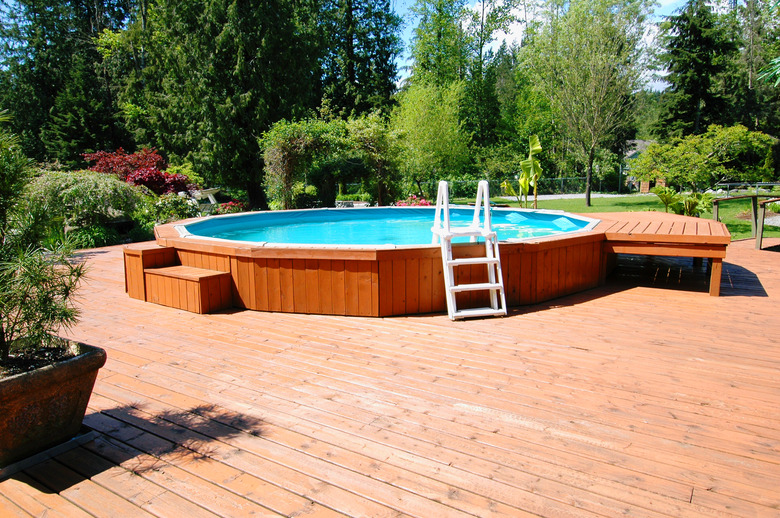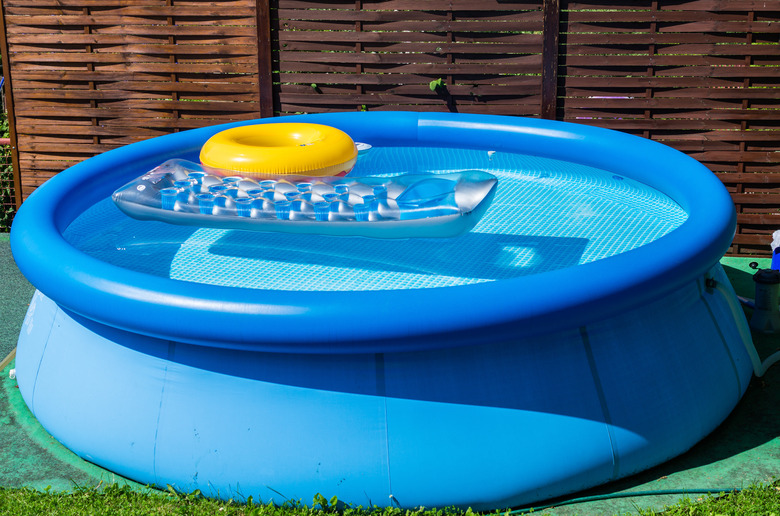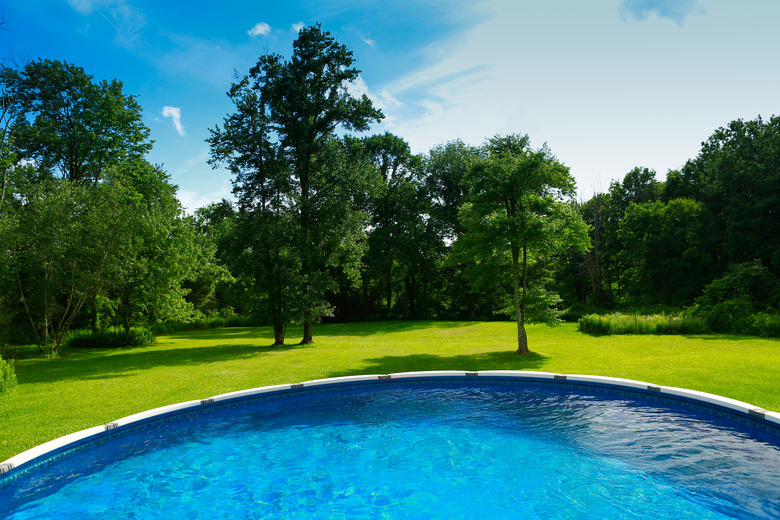Choosing The Right Type Of Above-Ground Swimming Pool
If you long to spend lazy summer afternoons floating blissfully in your pool, an above-ground pool can get you there affordably. Above-ground swimming pools are much less expensive than in-ground pools and are easier to install. You want your pool to be a joy and not a nuisance, however, so buying the right pool matters. The size, shape and depth of your pool are all important, as is the material from which it's made.
Metal Pool Construction
Metal Pool Construction
When above-ground pools became popular, most were made of metal. Metal pools are still readily available and have several advantages. One is their sheer strength and durability. These frames are sturdy, making it possible to build a bigger pool that holds more water. The exact characteristics of a metal pool vary, however, based on the type of metal used.
Steel frames are quite heavy, but they're rugged enough to handle whatever most swimmers dish out. An intense game of volleyball in the pool is less likely to result in a dent than the same game played in a pool with an aluminum frame, for example. Aluminum is much lighter, however, and is easier to install.
There are disadvantages to metal frames. Although they do resist rust, corrosion can and does happen on steel frames. If you opt for steel, it's best to look for a pool that's had its support beams dipped in zinc. Also look for one with an interior epoxy or resin coating that sits between the pool wall and the liner. Know that aluminum will oxidize unless you apply a preventive coating to it every few years.
Perhaps the biggest drawback of metal pool frames is that they get hot to the touch in the sunlight. Some above-ground swimming pool manufacturers solve this problem by coating in vinyl the metal parts that are likely to contact swimmers.
Resin and Hybrid Above-Ground Pools
Resin and Hybrid Above-Ground Pools
Resin may just be a fancy word for plastic, but don't let that keep you away from an above-ground pool made of resin. Swimming pools made of resin are quite tough. They resist warping and won't oxidize or rust like metal pools. They also stay much cooler to the touch when your pool bakes in the sun all day.
Note, however, that resin pools need to be made with a high-quality UV coating. Without it, the constant exposure to sunlight can cause chipping, cracking and flaking. Resin also doesn't come cheap. The average cost of an above-ground swimming pool is between $1,000 and $3,000, with metal at the low end and resin closer to the high end.
Some above-ground pools offer the best of both worlds. These hybrid units are made of metal for extra strength but feature resin in parts of the pool that swimmers are likely to touch. This prevents the possible burns that can result from bumping against hot metal.
Parts of the pool that frequently come in contact with the water are also made from resin. This ensures that the metal frame that supports the pool won't rust, corrode or oxidize. Hybrid pools cost more than metal pools but less than all-resin frames.
Above-Ground Alternative
Above-Ground Alternative
Above-ground pools work great in yards with ample flat space, but sloped yards can present a problem. If your lawn is extremely sloped, you may want to consider a semi in-ground pool. Also called radiant pools, these pools sit partially in the ground (like when they're tucked into a hillside) and partially above the ground.
To withstand the pressure of the earth pushing against them, semi in-ground pools require thicker walls and may need concrete reinforcement in some places. They're typically more expensive than traditional above-ground pools because they require a stronger frame, but they're still less expensive than traditional in-ground pools. You can expect to pay $5,000 to $15,000 for a semi in-ground pool depending on what you need. Still, this is significantly less than $18,000 to $20,000 for an in-ground pool.
Consider Inflatable Pools
Consider Inflatable Pools
If you're looking for a pool on a budget, don't dismiss inflatable pools as kiddie pools and overlook them. These pools are available in a wide variety of sizes, and it's possible to find an inflatable pool that will let you actually swim a few strokes.
These pools are the least expensive to buy and have an easy set up, taking about an hour, providing for a quick summer fix. Inflatable pools will get you in the water quickly, and you can easily take them down for the winter or if you need the yard space for something else. They fold into a pretty small package for easy storage when deflated, and their soft walls are safe for children.
They're not good for leaning, however. If you lean on the side of the pool during a casual conversation with someone outside the pool, expect water to spill over the sides of the pool. You can indeed set up an inflatable pool fairly quickly, but you'll need an electric air pump to do so. Although they're fairly tough, inflatable pools can get damaged or start to leak. Sharp objects like dog nails, sticks or jewelry can puncture the pool, as can roughhousing children.
If you go inflatable, make sure you pick a pool with a filter. If you choose one without, you'll need to periodically empty and clean the pool before filling it with fresh water.
If you plan to leave your pool up all summer, note that you should check the air pressure weekly. The temperature and humidity levels can change the pressure, and you may need to add air to the pool. The price of an inflatable above-ground pool starts at around $100, which makes them a very affordable option and worth the effort.
Size and Shape
Size and Shape
When choosing the right pool type, size and shape are just as important as the type of pool. Round pools are quite popular because they fit into smaller yards better and don't require extra buttressing. If you have limited space or only one or two swimmers, a 15-foot round pool will work for you.
To accommodate a family of four, however, you'll need to go with a 21- or 24-foot option. Do you have visions of epic neighborhood pool parties? You'll need to go to a large 33-foot pool that can hold nine or more swimmers (and plenty of gallons of water).
Oval pools are another popular option, but don't let them fool you. Oval pools look bigger than their round counterparts but may hold less water. A 15 x 30-foot oval above-ground pool looks larger than a 24-foot round pool, but the round pool actually holds more water. The extra buttressing required by oval pools also makes them a bit more expensive.
Again, if you only have one or two swimmers, a 12 x 24-foot oval pool is adequate. A family of four will need a 15 x 30 or 16 x 32-foot oval pool. Nine or more people will require an oval pool of 21 x 41 feet.
Square and rectangular pools are available as well, but these have more seams and require much more support. It's generally best to stick with round and oval pools unless you really have your heart set on a different shape.
Above-Ground Pool Depth
Above-Ground Pool Depth
You want to get the right type and size of pool but don't overlook depth. You don't want to end up with a very sturdy, long-lasting wading pool that disappoints you every time you climb in it. Pools are available with wall heights of 48, 52 and 54 inches. The taller the walls, of course, the deeper the pool. Wall size doesn't have to prevent you from going deeper, however.
When you buy an above-ground swimming pool, you're essentially just buying a huge ring. There is no bottom on the pool. Instead, the pool liner sits directly on the ground, often resting on a base of sand. If you want a deep end in your pool, you can dig one. You'll simply use an expandable liner in the pool.
References
- Swim Universty: Above Ground Pools: How to Choose the Best
- Country Leisure: The Essential Guide to Above Ground Pools
- The Washington Post: Aboveground Pools Are Riding a Wave of Popularity. Consider These Factors Before Buying One.
- INYOpools: The 6 Steps to Buying an Above Ground Pool
- Thatcher Pools and Spas: Dive In To This Above Ground Pool Guide
- Country Leisure: Above Ground Pool vs Semi-Inground Pool – A Beginner's Guide
- Pools Above Ground: Resin And Hybrid Above Ground Pools
- Sunjoy Inflatables Manufacturing: Inflatable Swimming Pool Vs Metal Frame Pool
- Krossber Brothers Pool and Spa: Steel vs. Resin vs. Aluminum


